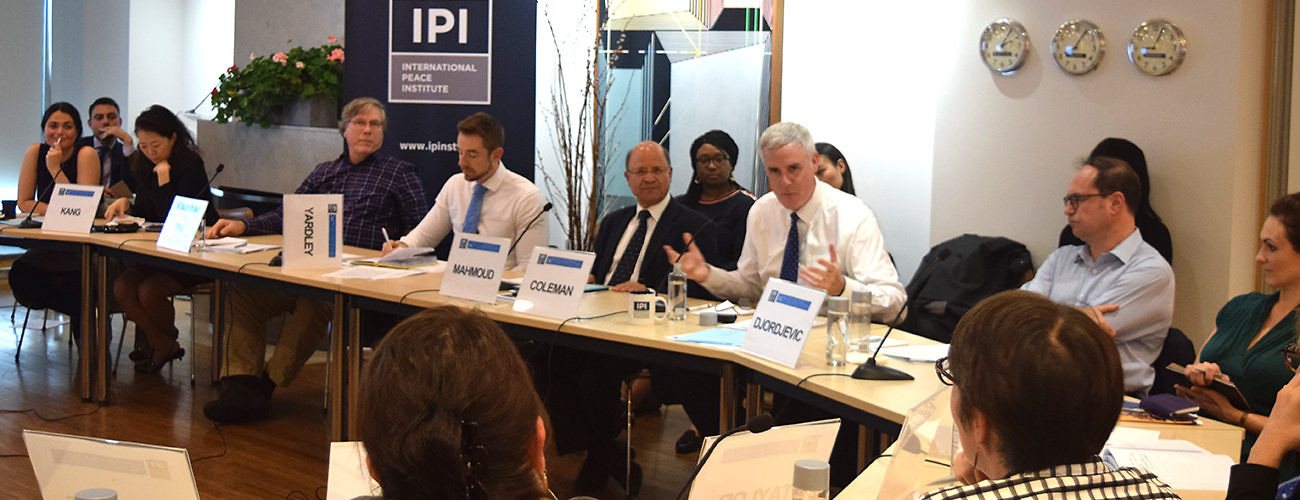On November 3rd, IPI welcomed researchers from the Advanced Consortium on Cooperation, Conflict and Complexity (AC4) at the Earth Institute-Columbia University to share their findings on the central attributes of peaceful communities. In attendance were representatives from various Permanent Missions to the UN, civil society representatives and UN staff.
The event, held under the Chatham House rule of non-attribution, was opened by Youssef Mahmoud, IPI Senior Adviser, who outlined the main features of IPI’s ongoing work on sustaining peace, which focuses in on modalities and processes for identifying and strengthening the existing resilient capacities of societies under stress, rather than the factors that drive and sustain conflict. To do this, he said, it is important to uncover and measure the factors that are associated with durable peace.
The participants then heard a presentation from lead researcher Peter T. Coleman, Executive Director of AC4, and his team, Douglas P. Fry, Larry S. Liebovitch and Jaclyn Donahue, which showcased the recent findings of their project entitled The Science of Sustaining Peace. They outlined the research being done at AC4, which aims to identify, map and model the factors relating to sustaining peace and the prevention of destructive conflict.
The research utilizes historical and anthropological data, among other sources, to identify the key factors present in peaceful societies throughout history and in the present day. The data shows, firstly, that peaceful societies are possible and war is a relatively new idea in the span of human history.
Secondly, the data reveals some key factors that peaceful societies have in common such as interconnections between subgroups and forms of interdependence, a culture of nonviolence and an overarching social identity. Dr. Coleman also highlighted that though these factors are common throughout peaceful societies, the relationships between them are sometimes unclear in the context of complex societies. Promoting one factor may have unforeseen consequences in relationship to other factors.
To better understand the relationship between these complex factors, the team at AC4 has created both a qualitative and a mathematical model. The models are intended to map data and factors, and foster a better understanding of the relationship between factors. These outputs will be used to assist policymakers in understanding the effects of interventions, and hopefully inform future policies on the road to sustaining peace.
Though the project is still ongoing, Dr. Coleman ended the presentation by offering preliminary policy recommendations on the implementation of sustaining peace. Research has shown that one of the key investments policymakers can make is in peace education. By promoting education at a young age that focuses on topics such as conflict resolution, non-warring values, cooperative learning, and violence prevention, children will learn to think critically and make decisions that will promote peaceful societies throughout their lives.
The floor was then opened to participants for comment. Speakers noted that existing work on the topic contains considerable gaps, such as incomplete research and inadequate consultation with local voices in sustaining peace. It was also noted that existing research often lacks a gender component, which is integral to sustaining peace. Speakers further argued that in-depth research that incorporates inclusive consultation will greatly assist their work as policy makers. Many speakers expressed interest in knowing how the research presented by AC4 and other institutions can be translated into coherent policy recommendations that make the sustaining peace agenda more effective.
Mr. Mahmoud closed the event by reiterating that emphasis must be put on mapping sustainable peace as well as spotting drivers of conflict. He commended the research produced by AC4, and he noted that evidence-based analysis will continue to be important to understanding and implementing sustainable peace.








